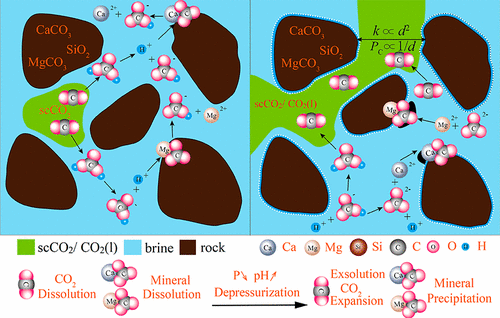当前位置:
X-MOL 学术
›
Acc. Chem. Res.
›
论文详情
Our official English website, www.x-mol.net, welcomes your feedback! (Note: you will need to create a separate account there.)
Effect of Mineral Dissolution/Precipitation and CO2 Exsolution on CO2 transport in Geological Carbon Storage
Accounts of Chemical Research ( IF 18.3 ) Pub Date : 2017-08-16 00:00:00 , DOI: 10.1021/acs.accounts.6b00651 Ruina Xu 1 , Rong Li 1 , Jin Ma 1 , Di He 1 , Peixue Jiang 1
Accounts of Chemical Research ( IF 18.3 ) Pub Date : 2017-08-16 00:00:00 , DOI: 10.1021/acs.accounts.6b00651 Ruina Xu 1 , Rong Li 1 , Jin Ma 1 , Di He 1 , Peixue Jiang 1
Affiliation

|
Geological carbon sequestration (GCS) in deep saline aquifers is an effective means for storing carbon dioxide to address global climate change. As the time after injection increases, the safety of storage increases as the CO2 transforms from a separate phase to CO2(aq) and HCO3– by dissolution and then to carbonates by mineral dissolution. However, subsequent depressurization could lead to dissolved CO2(aq) escaping from the formation water and creating a new separate phase which may reduce the GCS system safety. The mineral dissolution and the CO2 exsolution and mineral precipitation during depressurization change the morphology, porosity, and permeability of the porous rock medium, which then affects the two-phase flow of the CO2 and formation water. A better understanding of these effects on the CO2–water two-phase flow will improve predictions of the long-term CO2 storage reliability, especially the impact of depressurization on the long-term stability.
中文翻译:

矿物溶解/沉淀和CO 2释放对地质碳储量中CO 2运移的影响
深层盐水含水层中的地质碳固存(GCS)是一种有效的二氧化碳存储方法,可以解决全球气候变化问题。随着注入时间的增加,随着CO 2从单独的相转变为CO 2(aq)和HCO 3 –通过溶解,然后通过矿物溶解转变为碳酸盐,储存的安全性也随之提高。但是,随后的减压可能导致溶解的CO 2(aq)从地层水中逸出并形成新的分离相,这可能会降低GCS系统的安全性。矿物溶解和CO 2减压过程中的固溶和矿物沉淀改变了多孔岩石介质的形态,孔隙率和渗透率,进而影响了CO 2和地层水的两相流。更好地了解这些对CO 2-水两相流的影响将改善对CO 2长期存储可靠性的预测,尤其是减压对长期稳定性的影响。
更新日期:2017-08-16
中文翻译:

矿物溶解/沉淀和CO 2释放对地质碳储量中CO 2运移的影响
深层盐水含水层中的地质碳固存(GCS)是一种有效的二氧化碳存储方法,可以解决全球气候变化问题。随着注入时间的增加,随着CO 2从单独的相转变为CO 2(aq)和HCO 3 –通过溶解,然后通过矿物溶解转变为碳酸盐,储存的安全性也随之提高。但是,随后的减压可能导致溶解的CO 2(aq)从地层水中逸出并形成新的分离相,这可能会降低GCS系统的安全性。矿物溶解和CO 2减压过程中的固溶和矿物沉淀改变了多孔岩石介质的形态,孔隙率和渗透率,进而影响了CO 2和地层水的两相流。更好地了解这些对CO 2-水两相流的影响将改善对CO 2长期存储可靠性的预测,尤其是减压对长期稳定性的影响。



























 京公网安备 11010802027423号
京公网安备 11010802027423号